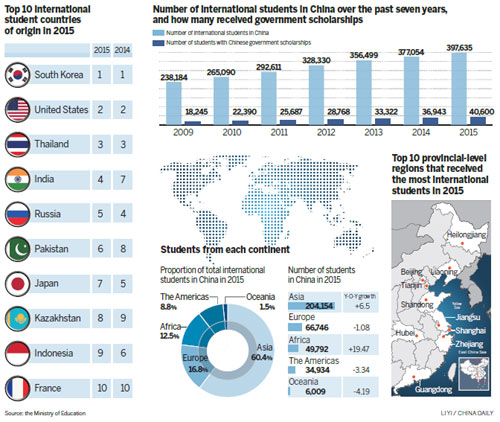【China Daily】Belt and Road Initiative helps swell foreign student numbers
2016年4月19日
An amateur opera singer from Zhenjiang, Jiangsu province, helps an exchange student at Jiangsu University paint his face for a performance in March.Shi Yucheng / For China Daily
The number of foreign students in China, especially from countries related to the Belt and Road Initiative, has increased greatly, according to the Ministry of Education.
The ministry posted statistics on its website on Wednesday showing that countries along the Silk Road Economic Belt and the 21st Century Maritime Silk Road, such as India, Pakistan and Kazakhstan, have further grown as large sources of international students in China.

With 16,694 students in China last year, India, for example, went from the seventh- to fourth-largest source country. Pakistan rose from the eighth- to sixth-largest, with a 17 percent rise in student numbers.
Miao Lu, secretary-general of the Center for China and Globalization(CCG), a Beijing think tank that focuses on international talent, said the growth in foreign student numbers from Silk Road Economic Belt and 21st Century Maritime Silk Road countries was a result of the ever-close exchange between China and these countries.
"The booming economic and people-to-people exchanges between China and these countries have enabled more students from these countries to realize their potential, as well as benefit from mastering the Chinese language and culture," Miao said. "This adds to their willingness to study in China."
Zheng Tianying, CEO of the University and College Admissions System, a company that serves overseas students who hope to attend a Chinese college or university, said the scholarship program for students from countries along the Belt and Road has significantly helped attract more.
The program allows 10,000 students a year from these countries to study in China with a full scholarship from the Chinese government.
Last year, almost 400,000 international students were studying in China, a 5.5 percent year-on-year increase.
Almost half came to work on a degree, and more than 40,000, more than 10 percent, received a Chinese government scholarship.
They came from 202 countries and regions around the world – most from Asia, while the number of students from Europe, the Americas and Oceania dropped.
Zheng said that decline could have something to do with the air pollution, as well as China’s changing economic situation.
"In the past few years, many students from European and American countries came to study and find opportunities in China because of the gloomy economic situation in their own countries," Zheng said.
"But in the last year or two, using the United States as an example, students’ willingness to come declined as the economy in the US improved," he said.
According to the ministry, Beijing, followed by Shanghai, remained the two favorite cities for China’s international students. (By Zhao Xinying)
From China Daily, 2016-4-16







